Abstract
Through its role in lipid metabolism, Apolipoprotein epsilon4 (ApoE4) may affect "brain repair" in stroke, brain hemorrhage, Alzheimer's disease, and other brain injury syndromes for which African Americans may have greater morbidity and mortality. Cross-cultural evaluations of these and other genetic factors may provide insight on possible ethnic differences in risk of morbidity to acute central nervous system (CNS) injury and chronic neurodegenerative processes. As an initial step toward expanding knowledge of ApoE allele frequencies for persons of African descent, we compared ApoE genotype of a group of 70 young Ugandans to 59 (subset of a larger group of 342 African Americans of all ages) age-matched African Americans and to published frequencies for Caucasians and Asians. We found that the ApoE4 and epsilon2 alleles are more frequent in Ugandans (U) than Caucasians (C) or Asians (A) with corresponding alleles showing significant elevations of epsilon2 (U 15.71%, C 8.40%, A 4.20%) and 14 (U 25%, C 13.70%, A 8.90%) (p < .001). Comparing the differences between Ugandans and age-appropriate African Americans (AA) was not statically significant, but this outcome may be due to small sample size. These results provide the only published ApoE frequencies for Ugandans and the complete set of data provides the largest published community group of ApoE frequencies for African Americans.
Full text
PDF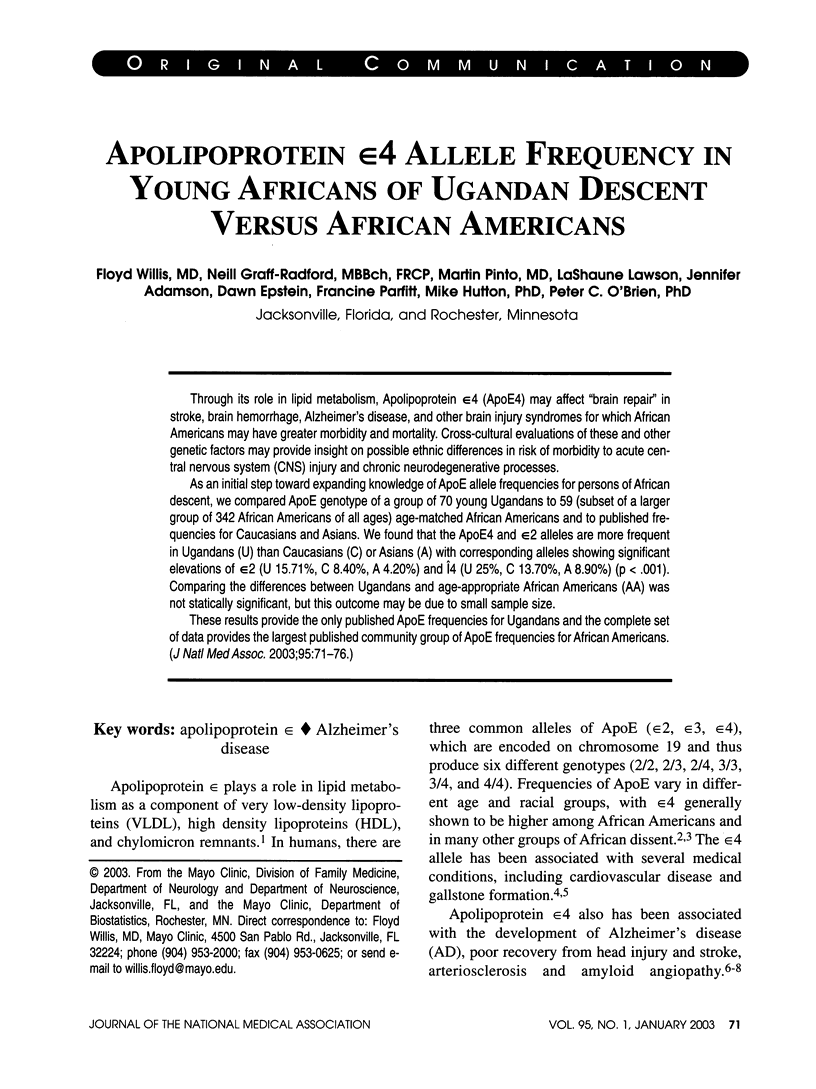
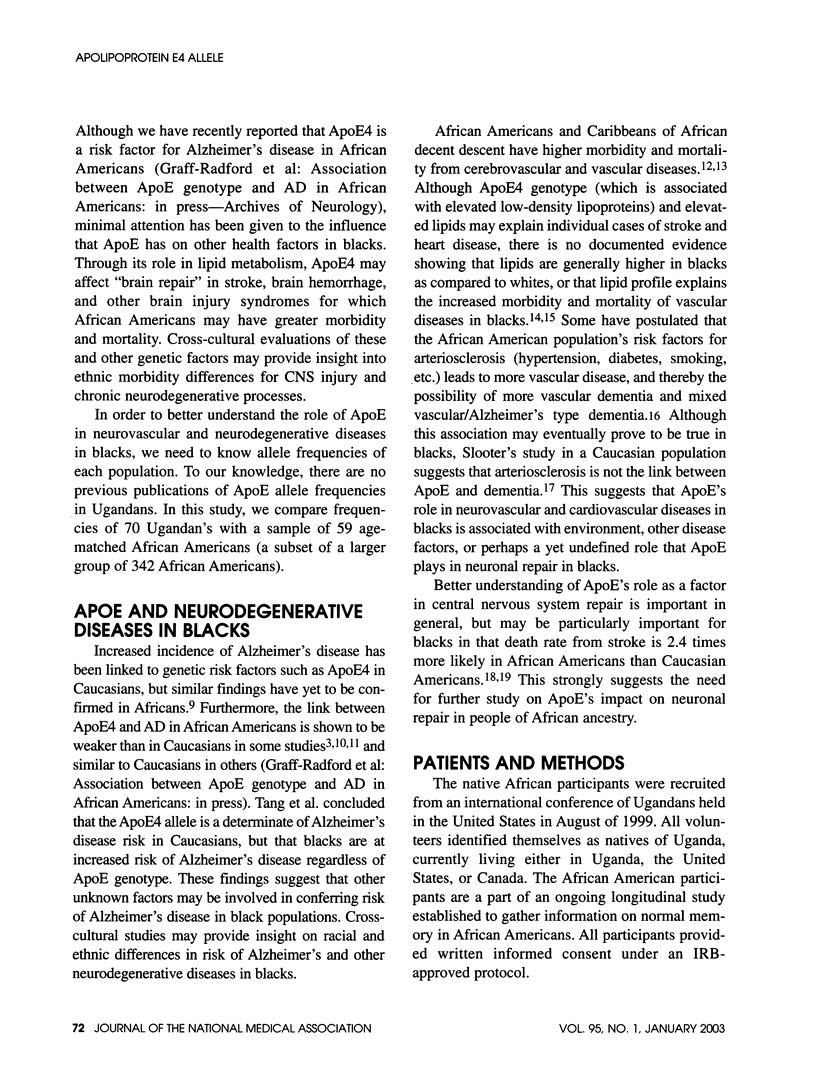
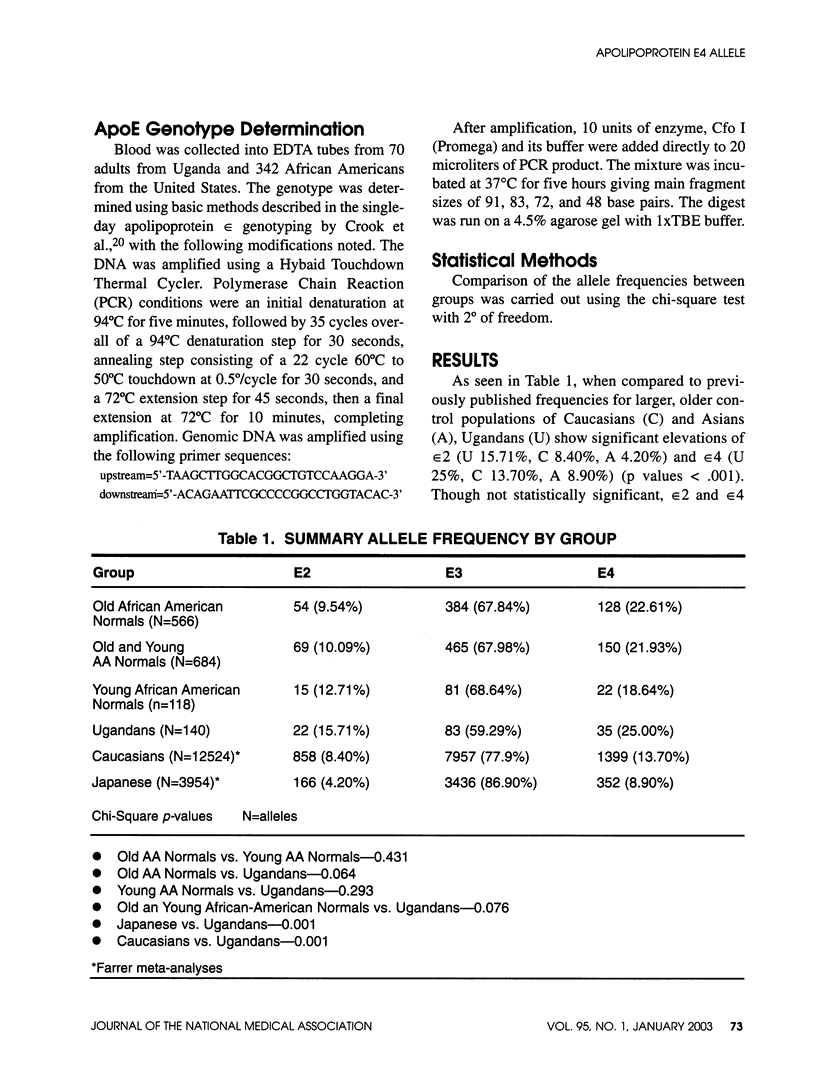
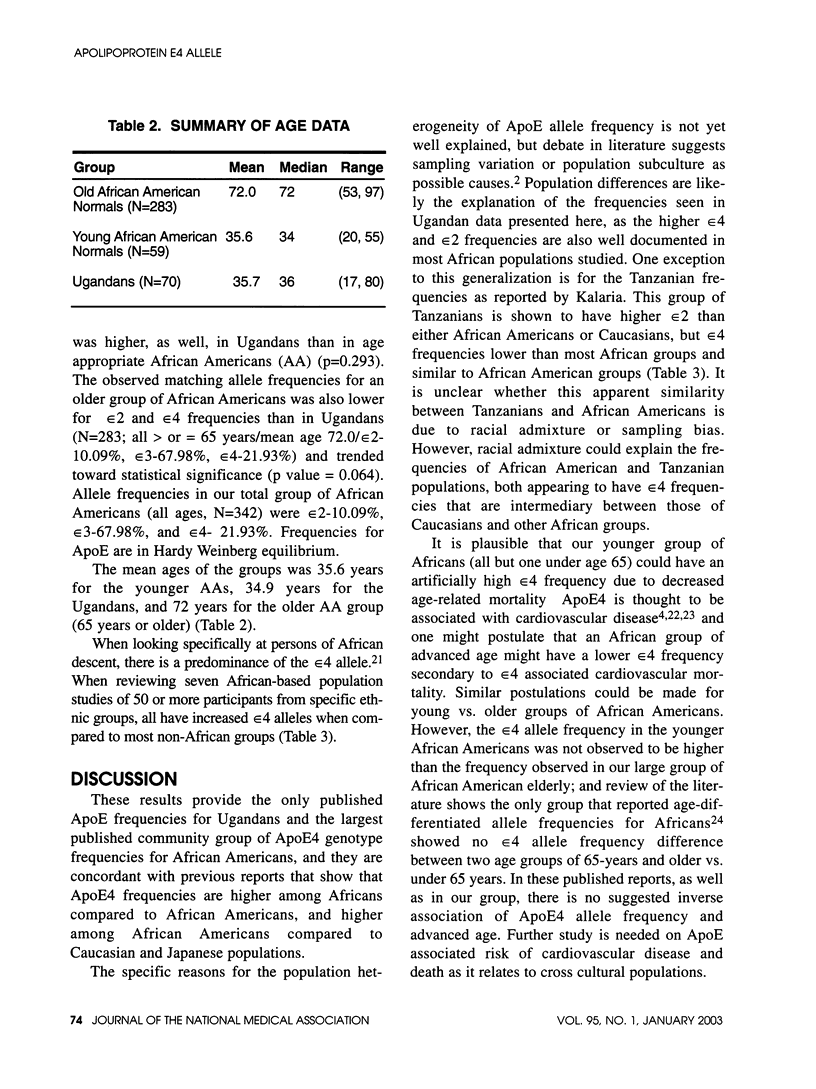
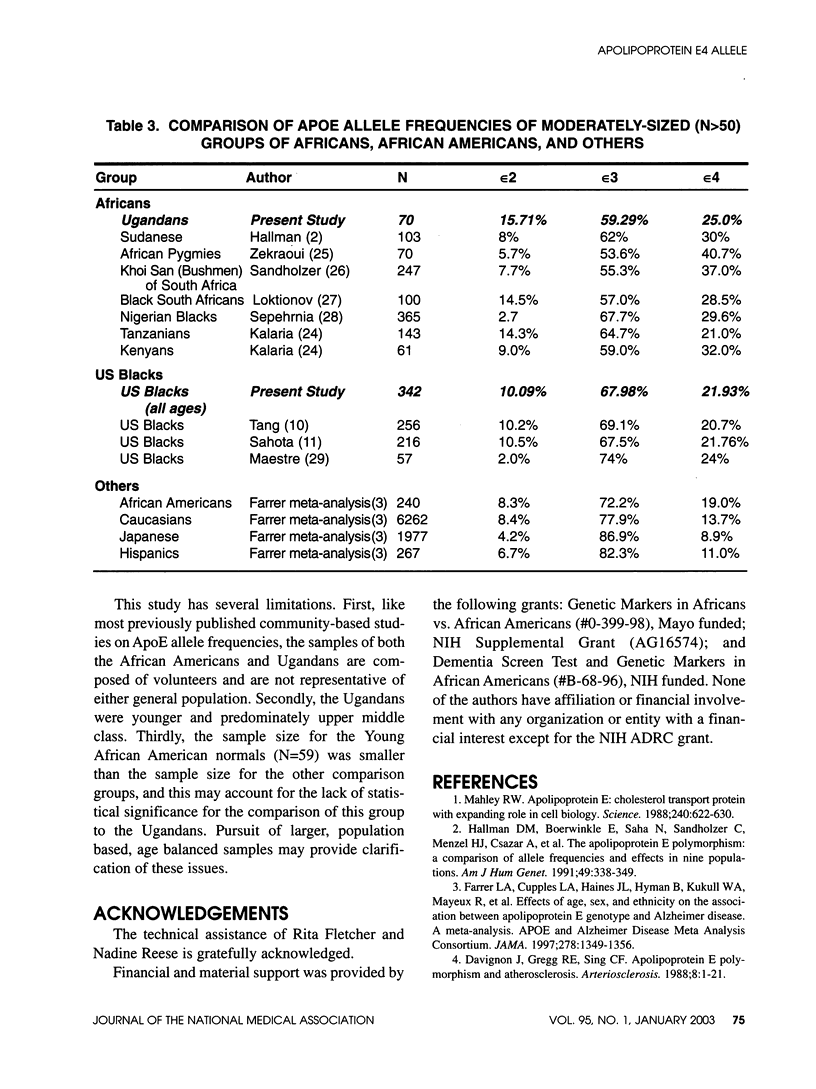
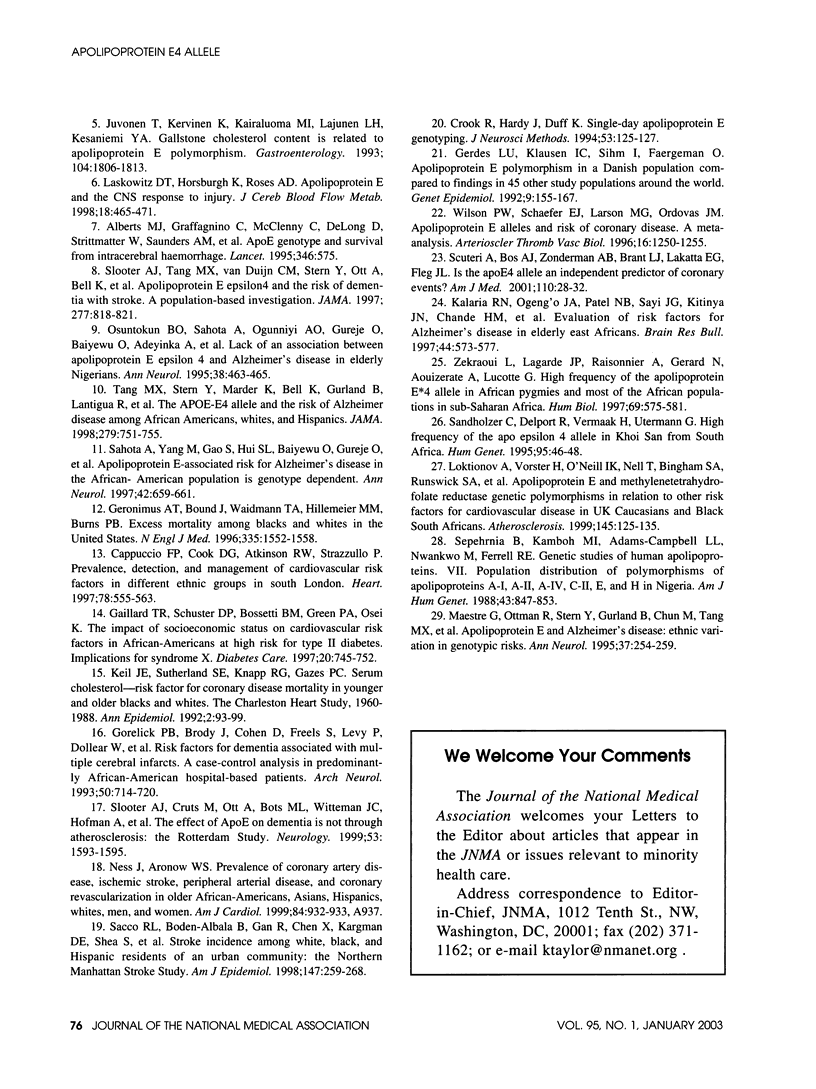
Selected References
These references are in PubMed. This may not be the complete list of references from this article.
- Alberts M. J., Graffagnino C., McClenny C., DeLong D., Strittmatter W., Saunders A. M., Roses A. D. ApoE genotype and survival from intracerebral haemorrhage. Lancet. 1995 Aug 26;346(8974):575–575. doi: 10.1016/s0140-6736(95)91411-0. [DOI] [PubMed] [Google Scholar]
- Cappuccio F. P., Cook D. G., Atkinson R. W., Strazzullo P. Prevalence, detection, and management of cardiovascular risk factors in different ethnic groups in south London. Heart. 1997 Dec;78(6):555–563. doi: 10.1136/hrt.78.6.555. [DOI] [PMC free article] [PubMed] [Google Scholar]
- Crook R., Hardy J., Duff K. Single-day apolipoprotein E genotyping. J Neurosci Methods. 1994 Aug;53(2):125–127. doi: 10.1016/0165-0270(94)90168-6. [DOI] [PubMed] [Google Scholar]
- Davignon J., Gregg R. E., Sing C. F. Apolipoprotein E polymorphism and atherosclerosis. Arteriosclerosis. 1988 Jan-Feb;8(1):1–21. doi: 10.1161/01.atv.8.1.1. [DOI] [PubMed] [Google Scholar]
- Farrer L. A., Cupples L. A., Haines J. L., Hyman B., Kukull W. A., Mayeux R., Myers R. H., Pericak-Vance M. A., Risch N., van Duijn C. M. Effects of age, sex, and ethnicity on the association between apolipoprotein E genotype and Alzheimer disease. A meta-analysis. APOE and Alzheimer Disease Meta Analysis Consortium. JAMA. 1997 Oct 22;278(16):1349–1356. [PubMed] [Google Scholar]
- Gaillard T. R., Schuster D. P., Bossetti B. M., Green P. A., Osei K. The impact of socioeconomic status on cardiovascular risk factors in African-Americans at high risk for type II diabetes. Implications for syndrome X. Diabetes Care. 1997 May;20(5):745–752. doi: 10.2337/diacare.20.5.745. [DOI] [PubMed] [Google Scholar]
- Gerdes L. U., Klausen I. C., Sihm I., Faergeman O. Apolipoprotein E polymorphism in a Danish population compared to findings in 45 other study populations around the world. Genet Epidemiol. 1992;9(3):155–167. doi: 10.1002/gepi.1370090302. [DOI] [PubMed] [Google Scholar]
- Geronimus A. T., Bound J., Waidmann T. A., Hillemeier M. M., Burns P. B. Excess mortality among blacks and whites in the United States. N Engl J Med. 1996 Nov 21;335(21):1552–1558. doi: 10.1056/NEJM199611213352102. [DOI] [PubMed] [Google Scholar]
- Gorelick P. B., Brody J., Cohen D., Freels S., Levy P., Dollear W., Forman H., Harris Y. Risk factors for dementia associated with multiple cerebral infarcts. A case-control analysis in predominantly African-American hospital-based patients. Arch Neurol. 1993 Jul;50(7):714–720. doi: 10.1001/archneur.1993.00540070034011. [DOI] [PubMed] [Google Scholar]
- Hallman D. M., Boerwinkle E., Saha N., Sandholzer C., Menzel H. J., Csázár A., Utermann G. The apolipoprotein E polymorphism: a comparison of allele frequencies and effects in nine populations. Am J Hum Genet. 1991 Aug;49(2):338–349. [PMC free article] [PubMed] [Google Scholar]
- Juvonen T., Kervinen K., Kairaluoma M. I., Lajunen L. H., Kesäniemi Y. A. Gallstone cholesterol content is related to apolipoprotein E polymorphism. Gastroenterology. 1993 Jun;104(6):1806–1813. doi: 10.1016/0016-5085(93)90662-v. [DOI] [PubMed] [Google Scholar]
- Kalaria R. N., Ogeng'o J. A., Patel N. B., Sayi J. G., Kitinya J. N., Chande H. M., Matuja W. B., Mtui E. P., Kimani J. K., Premkumar D. R. Evaluation of risk factors for Alzheimer's disease in elderly east Africans. Brain Res Bull. 1997;44(5):573–577. doi: 10.1016/s0361-9230(97)00310-9. [DOI] [PubMed] [Google Scholar]
- Keil J. E., Sutherland S. E., Knapp R. G., Gazes P. C. Serum cholesterol--risk factor for coronary disease mortality in younger and older blacks and whites. The Charleston Heart Study, 1960-1988. Ann Epidemiol. 1992 Jan-Mar;2(1-2):93–99. [PubMed] [Google Scholar]
- Laskowitz D. T., Horsburgh K., Roses A. D. Apolipoprotein E and the CNS response to injury. J Cereb Blood Flow Metab. 1998 May;18(5):465–471. doi: 10.1097/00004647-199805000-00001. [DOI] [PubMed] [Google Scholar]
- Loktionov A., Vorster H., O'Neill I. K., Nell T., Bingham S. A., Runswick S. A., Cummings J. H. Apolipoprotein E and methylenetetrahydrofolate reductase genetic polymorphisms in relation to other risk factors for cardiovascular disease in UK Caucasians and Black South Africans. Atherosclerosis. 1999 Jul;145(1):125–135. doi: 10.1016/s0021-9150(99)00022-2. [DOI] [PubMed] [Google Scholar]
- Maestre G., Ottman R., Stern Y., Gurland B., Chun M., Tang M. X., Shelanski M., Tycko B., Mayeux R. Apolipoprotein E and Alzheimer's disease: ethnic variation in genotypic risks. Ann Neurol. 1995 Feb;37(2):254–259. doi: 10.1002/ana.410370217. [DOI] [PubMed] [Google Scholar]
- Mahley R. W. Apolipoprotein E: cholesterol transport protein with expanding role in cell biology. Science. 1988 Apr 29;240(4852):622–630. doi: 10.1126/science.3283935. [DOI] [PubMed] [Google Scholar]
- Ness J., Aronow W. S. Prevalence of coronary artery disease, ischemic stroke, peripheral arterial disease, and coronary revascularization in older African-Americans, Asians, Hispanics, whites, men, and women. Am J Cardiol. 1999 Oct 15;84(8):932-3, A7. doi: 10.1016/s0002-9149(99)00470-1. [DOI] [PubMed] [Google Scholar]
- Osuntokun B. O., Sahota A., Ogunniyi A. O., Gureje O., Baiyewu O., Adeyinka A., Oluwole S. O., Komolafe O., Hall K. S., Unverzagt F. W. Lack of an association between apolipoprotein E epsilon 4 and Alzheimer's disease in elderly Nigerians. Ann Neurol. 1995 Sep;38(3):463–465. doi: 10.1002/ana.410380319. [DOI] [PubMed] [Google Scholar]
- Sacco R. L., Boden-Albala B., Gan R., Chen X., Kargman D. E., Shea S., Paik M. C., Hauser W. A. Stroke incidence among white, black, and Hispanic residents of an urban community: the Northern Manhattan Stroke Study. Am J Epidemiol. 1998 Feb 1;147(3):259–268. doi: 10.1093/oxfordjournals.aje.a009445. [DOI] [PubMed] [Google Scholar]
- Sahota A., Yang M., Gao S., Hui S. L., Baiyewu O., Gureje O., Oluwole S., Ogunniyi A., Hall K. S., Hendrie H. C. Apolipoprotein E-associated risk for Alzheimer's disease in the African-American population is genotype dependent. Ann Neurol. 1997 Oct;42(4):659–661. doi: 10.1002/ana.410420418. [DOI] [PubMed] [Google Scholar]
- Sandholzer C., Delport R., Vermaak H., Utermann G. High frequency of the apo epsilon 4 allele in Khoi San from South Africa. Hum Genet. 1995 Jan;95(1):46–48. doi: 10.1007/BF00225073. [DOI] [PubMed] [Google Scholar]
- Scuteri A., Bos A. J., Zonderman A. B., Brant L. J., Lakatta E. G., Fleg J. L. Is the apoE4 allele an independent predictor of coronary events? Am J Med. 2001 Jan;110(1):28–32. doi: 10.1016/s0002-9343(00)00639-2. [DOI] [PubMed] [Google Scholar]
- Sepehrnia B., Kamboh M. I., Adams-Campbell L. L., Nwankwo M., Ferrell R. E. Genetic studies of human apolipoproteins. VII. Population distribution of polymorphisms of apolipoproteins A-I, A-II, A-IV, C-II, E, and H in Nigeria. Am J Hum Genet. 1988 Dec;43(6):847–853. [PMC free article] [PubMed] [Google Scholar]
- Slooter A. J., Cruts M., Ott A., Bots M. L., Witteman J. C., Hofman A., Van Broeckhoven C., Breteler M. M., van Duijn C. M. The effect of APOE on dementia is not through atherosclerosis: the Rotterdam Study. Neurology. 1999 Oct 22;53(7):1593–1595. doi: 10.1212/wnl.53.7.1593. [DOI] [PubMed] [Google Scholar]
- Slooter A. J., Tang M. X., van Duijn C. M., Stern Y., Ott A., Bell K., Breteler M. M., Van Broeckhoven C., Tatemichi T. K., Tycko B. Apolipoprotein E epsilon4 and the risk of dementia with stroke. A population-based investigation. JAMA. 1997 Mar 12;277(10):818–821. doi: 10.1001/jama.277.10.818. [DOI] [PubMed] [Google Scholar]
- Tang M. X., Stern Y., Marder K., Bell K., Gurland B., Lantigua R., Andrews H., Feng L., Tycko B., Mayeux R. The APOE-epsilon4 allele and the risk of Alzheimer disease among African Americans, whites, and Hispanics. JAMA. 1998 Mar 11;279(10):751–755. doi: 10.1001/jama.279.10.751. [DOI] [PubMed] [Google Scholar]
- Wilson P. W., Schaefer E. J., Larson M. G., Ordovas J. M. Apolipoprotein E alleles and risk of coronary disease. A meta-analysis. Arterioscler Thromb Vasc Biol. 1996 Oct;16(10):1250–1255. doi: 10.1161/01.atv.16.10.1250. [DOI] [PubMed] [Google Scholar]
- Zekraoui L., Lagarde J. P., Raisonnier A., Gérard N., Aouizérate A., Lucotte G. High frequency of the apolipoprotein E *4 allele in African pygmies and most of the African populations in sub-Saharan Africa. Hum Biol. 1997 Aug;69(4):575–581. [PubMed] [Google Scholar]


